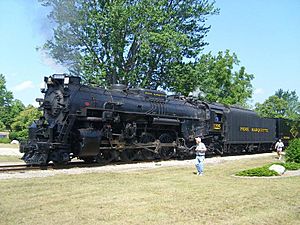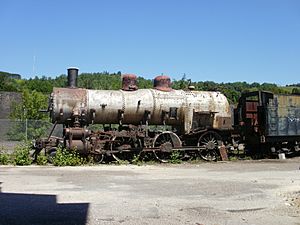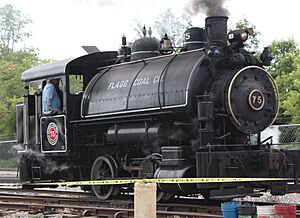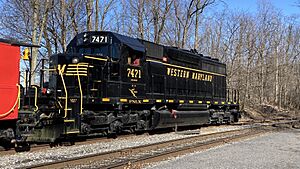Steam Railroading Institute facts for kids
Quick facts for kids Steam Railroading Institute |
|
|---|---|
| Locale | Michigan |
| Terminus | Owosso |
| Commercial operations | |
| Original gauge | 4 ft 8 1⁄2 in (1,435 mm) |
| Preserved operations | |
| Reporting mark | MSTX |
| Length | 1 mile (1.6 km) |
| Preserved gauge | 4 ft 8 1⁄2 in (1,435 mm) |
| Preservation history | |
| 1969 | MSU Railroad Club Founded |
| 1979 | MSU Railroad Club reorganized as the Michigan State Trust for Railway Preservation, Inc. (MSTRP) |
| 1983 | MSTRP moved from Lansing, MI to Owosso, MI |
| Headquarters | Owosso |
| Website | |
| https://michigansteamtrain.com/ | |
The Steam Railroading Institute (also known as MSTX) is a special group that works to save, fix, and run old trains and railroad items. It is a non-profit organization, which means it uses its money to help its cause, not to make a profit. The Institute is located in Owosso, Michigan. It started in 1969 as the Michigan State University Railroad Club. Later, it changed its name to the Michigan State Trust for Railway Preservation before becoming the Steam Railroading Institute.
The Institute is based at an old train yard that once belonged to the Ann Arbor Railroad. They run a heritage railroad, which means they offer fun train rides on special occasions. These rides often use powerful steam locomotives, like the famous Pere Marquette 1225 and Chicago and North Western 175. They also have many passenger cars and other train equipment.
Contents
History of the Steam Railroading Institute
In the late 1950s, a man named Cyrus Eaton, who led the Chesapeake and Ohio Railway, wanted to give a retired steam locomotive, No. 1225, to Michigan State University. He hoped engineering students could learn by working on a real train and keep it from being scrapped. The university accepted the locomotive in 1957, and it became part of the MSU Museum. It sat on campus, sometimes getting a fresh coat of paint, and people could visit it on football weekends.
In 1970, the Michigan State University Railroad Club, which was only a year old, decided to fix up No. 1225. Their idea was to use it to pull special trains that would bring fans to university football games.
However, Michigan State University was not interested in running a steam locomotive. So, in July 1979, the university president suggested that the club create a separate non-profit group to own No. 1225. This led to the founding of the Michigan State Trust for Railway Preservation. This group later became what we know today as the Steam Railroading Institute.
Train Equipment at the Institute
The Steam Railroading Institute has many different types of trains. They work hard to keep these historical machines running or to restore them so they can be used again.
Locomotives You Can See
The Institute has several locomotives. Here are some of the main ones:
| Number | Image | Type | Status |
|---|---|---|---|
| 1225 | Steam | Out of service, waiting for repairs | |
| 175 | Steam | Being restored | |
| 1313 (Mighty Mouse) | Diesel | Ready to run |
Visiting Locomotives
Sometimes, other locomotives visit the Institute. They are usually on loan from their owners.
| Number | Image | Type | Status | Owner | Notes |
|---|---|---|---|---|---|
| 75 | Steam | Ready to run | John and Barney Gramling | Used for special train rides. | |
| 7471 | Diesel | Ready to run | Precision Locomotive Leasing | Used to run on other railroads. | |
| 57 | Diesel | Ready to run | Precision Locomotive | Used to be part of MARC Train service. |
Passenger and Freight Cars
The Institute also has many different train cars. These include cars for passengers and cars for carrying goods (freight).
Passenger Cars
- Via Rail coaches: 5447, 5485, 5576, 5581, and 5646.
- Via Rail diner/lounge car: 762.
- Chesapeake & Ohio coach: 1615 (owned by a private person).
- Chesapeake & Ohio Pullman Sleeper: "City of Ashland" 2624.
- Chesapeake & Ohio/Chicago Great Western/Chicago & Northwestern Baggage/Combination Car: 462 (now 4062). This car is sometimes used to sell snacks on train rides.
- PRR 8275 "Norristown Inn" coach: This car was leased for many years and is now owned by the Institute.
- US Army 89639/ Amtrak 1363/ MSTX 1363 baggage car: Currently stored.
- MiTrain (formerly Metra) Gallery Cars.
Freight Cars
- Ann Arbor PS-1 Boxcar #1314.
- Chesapeake & Ohio/Pere Marquette Gondola #31262.
- Detroit & Mackinac Tank cars X-127 & X-128: These were fixed up to look like old Pure Oil and Dow Chemical tank cars.
- Detroit & Mackinac Gondola #3514.
- Pere Marquette Automobile car #72332.
- Wabash Boxcars (later Ann Arbor X4633 and X4646).
- A few flat cars.
Maintenance Cars
These cars help keep the tracks and other equipment in good shape.
- Rock Island #5000-series tender/ Auxiliary Tender #5000: This was once part of a large Rock Island locomotive. It now carries extra water for the PM 1225 on long trips.
- Pere Marquette #361: This used to be a troop sleeper car. Now it is the tool car for the 1225 locomotive.
- Grand Trunk Western Track Foreman's/ Bunk Car #58332.
- Detroit, Toledo & Ironton/ Grand Truck Burro crane #15027: A small crane that moves itself and is used for light jobs.
- Ex. US Navy Speeder/Gasoline Motor Car.
- Ann Arbor Caboose's #2838 & 2839.
- Pere Marquette Caboose #A909.
- Detroit & Mackinac power car #7: Also a former troop sleeper.
Buildings and Structures
The Steam Railroading Institute has some interesting buildings and structures at its site.
New Buffalo Turntable
The turntable is a large spinning platform that helps turn locomotives around. This one is 90 ft (27 m) long and was built in 1919. It was first used at the Pere Marquette railyard in New Buffalo, Michigan. It helped trains get into a 16-stall roundhouse (a circular building for storing and repairing locomotives). When that yard closed in 1984, the Institute bought the turntable. They moved it to their site and made it 10 ft (3.0 m) longer so it could hold bigger trains, like the PM 1225.
SRI Visitor Center
The Visitor Center for the Steam Railroading Institute is located inside an old freight warehouse. This building was used by the Ann Arbor railroad. Its foundation dates back to the 1880s. People think the first building there, which was a creamery, burned down in the 1920s. The Ann Arbor railroad used the warehouse to store grain and other goods. Later, it was rented out for storage. The Institute bought the building in 2004. They fixed it up to be their Visitor Center. It now has areas for exhibits, a model train display, and a collection of old railroad items and records.
 | Jackie Robinson |
 | Jack Johnson |
 | Althea Gibson |
 | Arthur Ashe |
 | Muhammad Ali |





